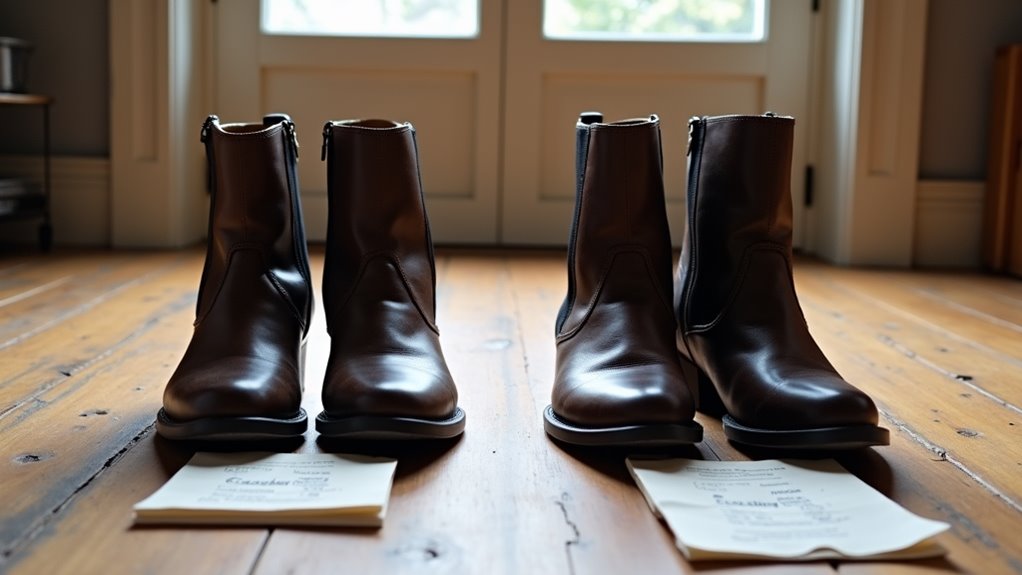Being frugal means making smart financial choices that maximize value and quality, while being cheap focuses solely on the lowest price regardless of consequences. You'll want to evaluate purchases based on cost-per-use and durability rather than just the price tag. Smart money habits include automating your savings, tracking expenses, and investing in quality items that last longer. While it might cost more upfront, choosing well-made products often saves you money in the long run by avoiding frequent replacements. Understanding these distinctions will transform your approach to spending and help you build lasting financial health.
Key Takeaways
- Frugal individuals prioritize value and quality while cheap behavior focuses solely on lowest price, often sacrificing product durability.
- Smart money habits include analyzing cost-per-use rather than upfront price to make financially sound purchasing decisions.
- Frugal shoppers research extensively and wait for sales on quality items instead of impulsively buying cheaper alternatives.
- Being cheap can damage relationships through undertipping and unfair cost-sharing, while frugality maintains financial and social balance.
- Quality investments in durable goods prevent frequent replacements and ultimately save money compared to repeatedly buying cheap items.
Defining Frugal Vs Cheap

What's the difference between being smart with money and being stingy? It comes down to understanding the distinction between frugal and cheap behaviors.
When you're frugal, you focus on maximizing value while considering both quality and cost. You'll invest in durable items, seek genuine bargains, and make thoughtful spending decisions that benefit your long-term financial health.
Being cheap, however, means prioritizing the lowest cost above all else. You might skip restaurant tips, buy items that quickly fall apart, or compromise others' well-being to save money.
Cheap behavior often leads to higher expenses over time and can damage relationships. While frugal people make smart financial choices that respect both their money and others, cheap individuals sacrifice quality and social connections for short-term savings.
Value-Based Shopping Strategies
To make the most of your money when shopping, you'll need a clear strategy focused on maximizing value rather than just finding the lowest prices. Consider the cost per use, durability, and long-term benefits of items before purchasing. Research products thoroughly, read reviews, and compare quality across different brands.
Create a priority list of features you need versus those you want, and don't pay extra for unnecessary additions. Track prices over time to identify genuine sales and seasonal discounts. When possible, buy classic, versatile items that serve multiple purposes rather than trendy, single-use products.
You'll also want to leverage price-matching policies, rewards programs, and cash-back opportunities without compromising on quality. Remember that spending more upfront on a reliable product often costs less than repeatedly replacing cheaper alternatives.
Hidden Costs of Being Cheap

While searching for the lowest prices may seem like smart financial planning, focusing solely on cheap purchases often leads to unexpected expenses down the road. When you buy low-quality items, you'll likely need to replace them more frequently, spending more money in the long run.
Choosing the cheapest option can also impact your health and safety. Inexpensive shoes might cause foot problems, cheap tools could break and cause injury, and low-quality food might lack essential nutrients. You'll end up paying more in medical bills or repairs.
Additionally, being overly frugal can damage relationships. Consistently undertipping service workers, splitting bills unfairly, or giving subpar gifts can strain friendships and professional connections.
Sometimes, investing more upfront in quality items and experiences proves more economical and beneficial.
Building Sustainable Money Habits
Creating lasting financial stability requires more than just following a budget or saving money sporadically.
You'll need to develop consistent behaviors that align with your long-term financial goals.
Start by automating your essential payments and savings contributions. This removes the temptation to skip or delay them.
Next, track your spending deliberately and review your financial habits monthly to identify areas for improvement.
Learn to distinguish between genuine needs and impulsive wants.
Make saving a priority by treating it as a non-negotiable expense.
Set up separate accounts for different purposes like emergencies, retirement, and specific goals.
When you receive extra money, allocate a portion to savings before spending.
Smart Spending Without Compromising Quality

Smart spending doesn't mean you always have to choose the cheapest option. Instead, focus on getting the best value for your money by evaluating quality, durability, and long-term benefits of your purchases.
You'll save more in the long run by investing in well-made items that last longer rather than repeatedly buying cheap replacements. Research products before buying, read reviews, and compare prices across different retailers.
Wait for sales on high-quality items rather than impulse-buying lower-quality alternatives.
Consider the cost per use: A $100 pair of shoes that lasts two years is better than a $30 pair that wears out in three months. Apply this thinking to everything from household appliances to clothing.
When possible, test products before buying and understand return policies to ensure you're making informed decisions.
Frequently Asked Questions
How Can I Convince My Family That Being Frugal Isn't Being Stingy?
Show your family how being frugal helps achieve long-term financial goals while still maintaining quality of life.
Explain that you're making mindful spending choices, not depriving yourself.
Share examples of how your frugal habits have led to savings for important things like education, retirement, or emergency funds.
Demonstrate that you're willing to spend on what truly matters while avoiding wasteful expenses.
What Percentage of Monthly Income Should Be Allocated to Discretionary Spending?
Back in ye olde days of financial planning, experts recommended the 50/30/20 rule.
You'll want to allocate 20-30% of your after-tax income for discretionary spending, which covers entertainment, dining out, and hobbies.
However, your personal percentage can vary based on your income level, living expenses, and financial goals.
If you're working to pay off debt or build savings, you might need to temporarily reduce this percentage.
Are Loyalty Programs and Couponing Worth the Time Investment?
You'll find loyalty programs and couponing worthwhile if you're strategic about it.
Focus on programs for items you regularly buy and stores you frequently visit. Digital coupons and apps have made the process much faster than traditional clipping.
When you combine store loyalty programs with manufacturer coupons, you can save 15-30% on everyday purchases without investing too much time.
When Is It Better to Rent Items Instead of Buying Them?
Do you really need that expensive item for the long haul?
You'll want to rent instead of buy when you're dealing with one-time or rare-use items like power tools, formal wear, or specialized equipment.
Renting's also smart for items that require extensive maintenance or storage space.
Consider renting if you're testing out new hobbies, hosting special events, or tackling short-term home improvement projects.
How Do Cultural Differences Affect Perceptions of Frugal Behavior?
Cultural perceptions of frugal behavior vary dramatically across societies.
You'll find that what's considered prudent money management in one culture might be viewed as stingy in another. In Japan, you're respected for being mindful with resources, while in some Western societies, you're expected to display material success.
Your immigrant parents' penny-pinching habits might clash with local spending norms, showing how deeply culture shapes our views on frugality.
Conclusion
You've mastered the art of being frugal when your friends stop calling you a cheapskate and start asking for financial advice. Remember, there's nothing smart about buying three $10 shoes that fall apart instead of one quality pair that lasts. So next time you're tempted to buy the knockoff version of something, ask yourself: "Am I being clever with money or just plain cheap?"

Leave a Reply